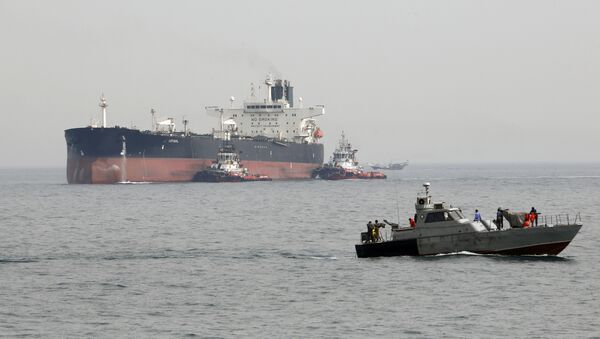Iranian Foreign Minister Mohammad Javad Zarif has warned the US that its attempts to stop Iranian oil exports will ultimately fail, the daily newspaper Iran reported.
"They can't think that Iran won't export oil and others will," he said.
Zarif warned Washington against keeping the "simplistic and impossible idea" of halting Tehran's oil exports and reminded that otherwise the US will face "consequences." He didn't specify what consequences the country would face.
The foreign minister also scolded the US saying its constant "zig-zagging" made it an untrustworthy partner to hold negotiations with.
READ MORE: EU Firms Likely to Cut Ties With Iran Despite Bloc's Bids to Thwart US Sanctions
Zarif added that perception of Iran has changed after the US withdrew from the Iran nuclear deal and that now most of the world supports Tehran.
"There is a big difference this time […] Before nobody supported Iran. But now, all the countries in the world are supporting Iran," he said.
On August 6 the US imposed sanctions on trade with Iran involving the Iranian currency, sovereign debt, cars, aircraft, gold and other metals. Washington plans on adding Iranian oil and gas to the sanctions in November this year.
Iran warned the US against blocking its oil trade, threatening to block the Strait of Hormuz, widely used by the regional states to export their oil and gas. US President Donald Trump responded by saying that Tehran shouldn't threaten the US otherwise it would face severe consequences.
READ MORE: Int'l Business Analyst Explains Who Is Biggest Winner in Anti-Iranian Sanctions
Trump has consistently been a harsh opponent of the Iran deal, calling it "defective at its core." He demanded to "fix" it, threatening to withdraw the US from the deal and to re-impose economic sanctions.
The re-imposed sanctions will affect any company doing business with Tehran, putting European firms at risk, as some have heavily invested in Iran and will likely be unwilling to break ties with the country.
READ MORE: Trump: Anyone Doing Business With Iran Won't Be Doing It With US
French President Emmanuel Macron and German Chancellor Angela Merkel, heads of two of the EU's leading countries, attempted to convince Trump to stick to the deal, but these efforts ultimately failed. On August 7, the EU put into effect a renewed Blocking Statute that aims to protect European businesses from US sanctions.




